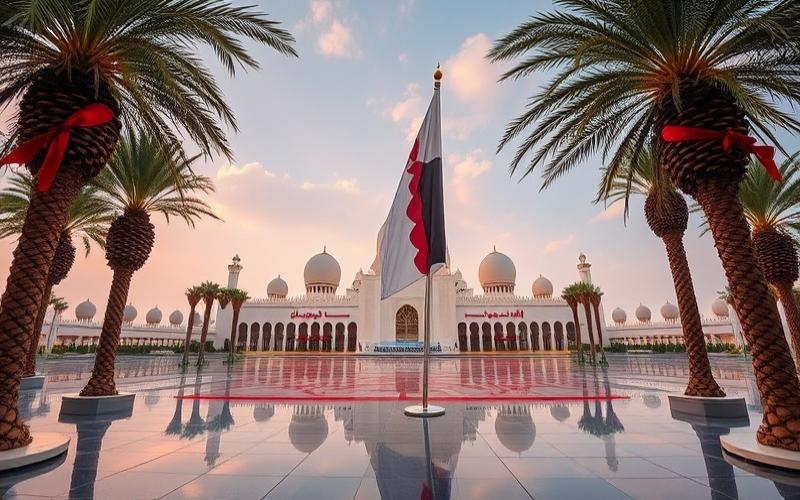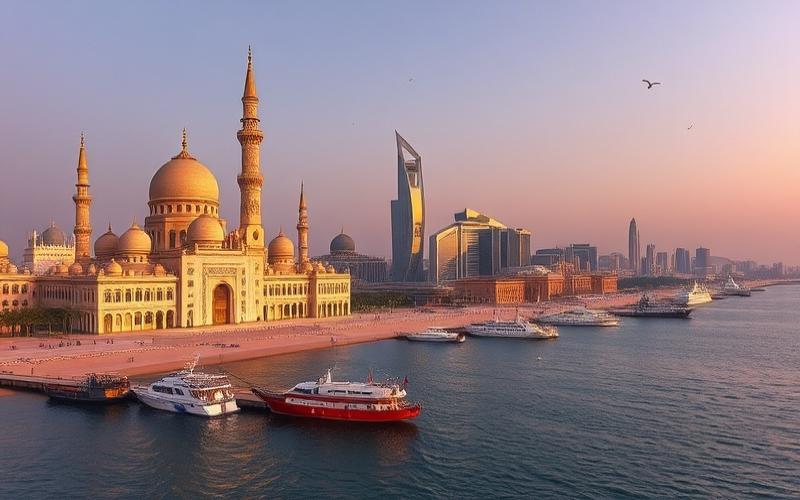
 Published on and written by Cyril Jarnias
Published on and written by Cyril Jarnias
Qatar, a small emirate in the Persian Gulf, has become a global economic powerhouse within just a few decades thanks to its vast natural gas reserves. This rapid growth has been accompanied by the development of a unique business culture, blending local traditions with international influences. Understanding the subtleties of this culture is essential for anyone looking to work or do business in this dynamic country.
The Pillars of Qatari Business Identity
Business culture in Qatar is built on a foundation of values deeply rooted in local society:
The importance of personal relationships: In Qatar, interpersonal connections are crucial in the business world. Taking the time to build trusting relationships with colleagues and partners is essential for success. Qataris place great importance on loyalty and reciprocity in professional relationships.
Respect for hierarchy: Qatar’s highly hierarchical social structure is reflected in the business world. Respect for superiors and elders is a fundamental value. Decisions are typically made at the top of the hierarchy, and employees expect to receive clear instructions from their superiors.
The importance of honor and reputation: In Qatari culture, preserving one’s honor and reputation is paramount. In business, this translates to great attention paid to brand image and company reputation. Behaviors that could tarnish this image are strongly discouraged.
Hospitality: Generosity and hospitality are central values of Qatari culture. In the professional world, this manifests as great attention paid to welcoming visitors and business partners. Business meetings are often preceded by informal exchanges over coffee or tea.
Balance between tradition and modernity: Qatar seeks to reconcile its cultural heritage with the demands of a modern, globalized economy. This duality is found in business culture, where international management practices coexist with traditional values.
Good to know:
Understanding and respecting these fundamental values is essential for successfully integrating into a Qatari company. They influence all aspects of professional life, from decision-making to daily interactions with colleagues.
Business Communication: Between Tradition and Modernity
Communication within Qatari companies reflects both the country’s cultural heritage and its openness to the world:
Importance of oral communication: In Arab culture, one’s word holds great value. In Qatar, oral exchanges are often preferred over written communications, especially for important discussions or negotiations.
Growing use of digital tools: With the country’s rapid modernization, Qatari companies have massively adopted modern communication technologies. Email, instant messaging, and video conferencing are now widely used, particularly in large companies and multinational corporations.
Indirect communication: Qatari culture values harmony in relationships. This often translates to indirect communication, where criticism or disagreements are expressed subtly to avoid direct confrontation.
Multilingualism: Arabic is the official language of Qatar, but English is very widely used in business. English proficiency is generally expected from managers and professionals, while knowledge of Arabic can be a significant asset.
Importance of context: Communication in Qatar is highly contextual. Messages are often implicit and require a good understanding of cultural and relational context to be properly interpreted.
Good to know:
To communicate effectively in a Qatari company, it’s important to be attentive to nuances and nonverbal signals. Patience and diplomacy are essential qualities for navigating this complex communication environment.
Qatari Leadership: Between Authority and Consensus
The management style in Qatar is influenced by both local traditions and modern international practices:
Strong hierarchical structure: Qatari companies typically have a clear and respected hierarchical structure. Managers are often seen as authority figures whose decisions are not openly questioned.
Centralized decision-making: Important decisions are generally made at the top of the hierarchy. Employees expect to receive clear instructions from their superiors rather than taking autonomous initiatives.
Importance of personal relationships: Qatari managers place great importance on building personal relationships with their teams. Leadership is often based on mutual trust and loyalty rather than formal processes.
Flexible time management: The concept of time in Qatari culture is more flexible than in many Western countries. Deadlines may be considered indicative rather than strict, and meetings may start late or last longer than expected.
Consensus approach: Although the structure is hierarchical, many Qatari managers seek to achieve consensus before making important decisions. Informal discussions and consultations are common.
Modernization of practices: With the increasing internationalization of Qatar’s economy, many companies are adopting more modern management practices inspired by international standards. This includes greater formalization of processes and increased attention to individual performance.
Good to know:
To succeed as a manager in Qatar, it’s crucial to find a balance between respecting local traditions and adopting modern management practices. Flexibility and the ability to adapt to different leadership styles are valuable assets.
Diversity and Inclusion: A Growing Challenge for Qatari Companies
Qatar, with its population mostly composed of expatriates, faces unique challenges regarding diversity and inclusion in the workplace:
An international workforce: With over 85% of its population composed of expatriates, Qatar offers an extremely diverse work environment. Companies must manage multicultural and multilingual teams, which presents both opportunities and challenges.
Promotion of local talent: As part of its “Qatarization” strategy, the government actively encourages the employment and promotion of Qatari citizens in the private sector. Companies are incentivized to develop the skills of local employees and prepare them for management positions.
Integration of women: Qatar has made significant progress in integrating women into the workforce. More and more companies are implementing policies aimed at promoting gender equality and supporting women’s professional advancement.
Management of cultural diversity: Qatari companies must navigate between respecting local traditions and creating an inclusive environment for employees of diverse backgrounds. This often involves cultural sensitivity training and adapted policies.
Inclusion of people with disabilities: Qatar has recently strengthened its efforts to promote the inclusion of people with disabilities in the workforce. Many companies are developing specific programs to recruit and integrate these talents.
Work-life balance: With a largely expatriate workforce, Qatari companies are paying increasing attention to work-life balance, particularly by offering flexible hours and benefits tailored to the needs of families.
Good to know:
Diversity and inclusion have become major issues for Qatari companies, not only to comply with local regulations but also to attract and retain the best talent in an increasingly competitive job market.
Engaging and Motivating: Winning Strategies in Qatar
In a dynamic and competitive job market, Qatari companies are developing innovative strategies to engage and motivate their employees:
Attractive compensation packages: Qatari companies often offer competitive compensation packages, including not only high salaries but also benefits such as housing, education allowances for children, and annual flight tickets for expatriates.
Professional development opportunities: Many companies invest heavily in training and developing their employees. Mentorship programs, internal training, and international mobility opportunities are commonly offered to retain talent.
Recognition and rewards: Qatari companies implement recognition systems to value exceptional performance. This can include bonuses, rapid promotions, or non-financial rewards like trips or additional leave.
Quality work environment: With the construction of many ultramodern offices, particularly in areas like West Bay in Doha, companies offer high-quality work environments, including relaxation spaces, gyms, and upscale cafeterias.
Corporate social responsibility: More and more Qatari companies are developing ambitious CSR programs, allowing employees to engage in community or environmental projects. This responds to a growing demand from young professionals to work for companies having a positive impact on society.
Flexibility and work-life balance: Although work culture in Qatar is traditionally intense, more and more companies recognize the importance of work-life balance. Flexible work policies and generous leave are increasingly common.
Corporate events and team building: Qatari companies regularly organize social events and team-building activities to strengthen team cohesion and create a sense of belonging, particularly important in a multicultural environment.
Good to know:
Employee engagement in Qatar requires a holistic approach, combining attractive financial incentives with opportunities for personal and professional development. The most successful companies are those that manage to create a stimulating work environment while respecting local cultural values.
Business culture in Qatar is constantly evolving, reflecting the rapid transformations the country is experiencing. Understanding and adapting to this unique culture is essential for professional success in this dynamic environment. Whether you’re an expatriate seeking to integrate or a local entrepreneur aiming to develop your business, the key to success lies in your ability to navigate between tradition and modernity, while remaining open to the opportunities offered by this rapidly growing market.
Disclaimer: The information provided on this website is for informational purposes only and does not constitute financial, legal, or professional advice. We encourage you to consult qualified experts before making any investment, real estate, or expatriation decisions. Although we strive to maintain up-to-date and accurate information, we do not guarantee the completeness, accuracy, or timeliness of the proposed content. As investment and expatriation involve risks, we disclaim any liability for potential losses or damages arising from the use of this site. Your use of this site confirms your acceptance of these terms and your understanding of the associated risks.


















